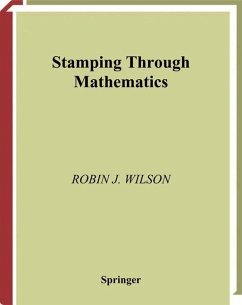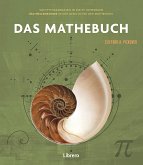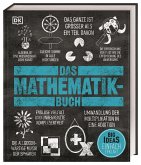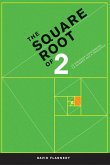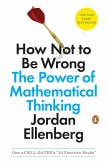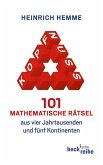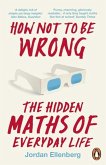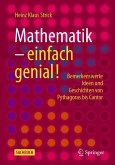The astonishing variety and beauty of mathematical elements in stamp design is brought to life in this collection of more than 350 stamps, each reproduced in enlarged format, in full color. With simple explantory text to accompany each stamp, the book makes the perfect gift for students, teachers, and anyone interested in the fascinating world of stamps, and mathematics.
Hinweis: Dieser Artikel kann nur an eine deutsche Lieferadresse ausgeliefert werden.
Hinweis: Dieser Artikel kann nur an eine deutsche Lieferadresse ausgeliefert werden.
Der Band wendet sich sowohl an Philatelisten, die sich die Mathematik als Sujet ausgesucht haben, wie auch an allgemeine Leser, die eine reich bebilderte Geschichte dieser Wissenschaft wünschen. ... Die Kapitel haben vom Zählstein bis zur Computerwissenschaft fast alle Zweige dieser Wissenschaft zum Thema. Moderne Algebra, Geometrie, Statistik sind ebenso vertreten wie physikalische Themen von der mittelalterlichen Astronomie bis zu Einsteins Relativitätstheorie und zur Quantenphysik. Mehrere Kapitel befassen sich mit den Errungenschaften verschiedener Kulturkreise oder geographischer Regionen. Aber auch Themen wie Kartographie, Navigationsinstrumente, mathematische Spiele und das World Wide Web" kommen zu Wort ... und zu Marke." Neue Zürcher Zeitung, 23. November 2001
From the reviews: MATHEMATICAL REVIEWS "An entertaining book that may by enjoyed by mathematicians, scientists, historians, teachers, students, and stamp collectors."
From the reviews: MATHEMATICAL REVIEWS "An entertaining book that may by enjoyed by mathematicians, scientists, historians, teachers, students, and stamp collectors."
From the reviews:
MATHEMATICAL REVIEWS
"?n entertaining book that may by enjoyed by mathematicians, scientists, historians, teachers, students, and stamp collectors."
"The title of this beautifully produced book should not discourage the reader. It is written for the layman with practically no technical formalism or equations. Each topic has an accompanying page of pertinent postage stamps. ... Many of the pertinent illustrative stamps reproduce paintings or sculptures. The make-up of the volume is an exemplar of the standards encompassed in the books published by Springer-Verlag, probably one of the world's most eminent publishers of scientific publications." (Journal of Fine and Performing Arts Philately, Vol. 50 (1), 2004)
"In Stamping through mathematics, Robin J. Wilson utilizes postage stamps from countries around the world as an intriguing means of presenting some major themes and people in the development of mathematics ... . It may serve as a unique introduction for ... students to the rich multicultural influences that have resulted in the historical developments yielding what we now call modern mathematics ... . Stamping through mathematics is an entertaining book that may be enjoyed by mathematicians, scientists, historians, teachers, students, and stamp collectors." (Craig W. Roberts, Mathematical Reviews, Issue 2002 f)
"If you are interested in the beauty of mathematics, you must go out and buy Robin Wilson's absolutely stunning book of mathematical stamps ... . It is not just a collection of beautiful images, because it does contain text explaining the stamps. And it is not a textbook, although it is a book one could easily share with students. It is just a fascinating book in which you can lose yourself for hours, one which may inspire you ... ." (Victor Katz, MAA Online, September, 2003)
"The book has full-color illustrations of nigh on 400 postage stamps which illustrate a mathematicaltheme. The format of the main body of the text has a righthand page of stamps on a particular topic, accompanied by a lefthand page giving some mathematical background to the illustrations, and over 50 topics are covered that way. ... the accompanying illustrations would certainly be useful for insertion in an all-too-often dry undergraduate lecture." (John Clark, New Zealand Mathematical Society Newsletter, Issue 85, 2002)
"This book is really exceptional: there are only a few books of this sort. ... it will be appreciated by many mathematicians, in particular by those interested in stamp collecting. The book shows nice pictures of 400 stamps without descriptions which are appreciated only by real collectors. ... The book would be a nice present for anybody with interests in mathematics and stamp collecting as well." (European Mathematical Society Newsletter, March, 2002)
"This book brings together 55 sets of stamps, each set consisting of around half a dozen examples related by a common theme. ... The accompanying text benefits from Wilson's broad knowledge of the history of mathematics, and is a fascinating read in its own right. ... Stamping through mathematics would be a good purchase for a school or public library. With its stunning illustrations and gentle text, the book will find favour among a wide audience." (Steve Abbott, The Mathematical Gazette, Vol. 86 (507), 2002)
"Approximately 400 illustrations are provided, all done in beautiful detail. ... A useful bibliography also provides additional information. The publisher has done a superb job of reproducing the stamps so they look almost real, employing bright colors. The color plates are fantastic! One need not be a mathematician to appreciate this book. ... It will make a wonderful coffee table book or gift and is fun to browse through! It is well worth the price." (Monty J. Strauss, Journal of the Indian Academy of Mathematics, Vol. 24 (1), 2002)
"How I wish I couldbuy thousands of copies and leave them around in schools ... for children to find it and learn that mathematics is a lively, fascinating subject touching all aspects of our lives. ... This book has an extraordinary value to young students and will capture their imagination. Using a fantastic collection of stamps from all over the world related, in author's opinion, to mathematics, Robin J. Wilson has woven a wonderful story of mathematics through the ages." (C. S. Yoganda, Journal of the Indian Academy of Mathematics, Vol. 24 (1), 2002)
"The appeal of the book is wonderful. ... on the left hand side you will find a topic with one page description of a theme. On the right hand side you will see superb color pictures of related stamps from all over the world. ... Finally the list of stamps describes the origin and the year printed in of the stamps shown in the book. This is a must for those who have mathematics books and a stamp collection on their shelves." (Péter Hajnal, Acta Scientiarum Mathematicarum, Vol. 68, 2002)
"This is a 'must' for all philatelists ... . Excellent enlarged color printings of roughly 400 postage stamps relating to mathematics from the earliest forms of counting to modern computers. ... This is a precious birthday present for anyone interested in postage stamps and perhaps will raise the appetite to learn more about the field and persons of mathematics. The author ... and the publisher are to be congratulated for this unique offer to the Mathematical Year 2000 ... ." (O. Ninnemann, Zentralblatt MATH, Vol. 984, 2002)
"This book is a wonderful production featuring superb pictures of various postage stamps with mathematical themes, which are used to take the reader through a snapshot history of mathematics. The author claims in the preface that 'this book is written for anyone interested in mathematics and its applications', and then goes on to say 'In particular, I hope that it will also attract a philatelicmembership." (Walter R. Bloom, The Australian Mathematical Society Gazette, Vol. 29 (1), 2002)
"A selective account of aspects of the history of mathematics which have appeared on postage stamps from across the world. ... this is an enjoyable book ... . The potted biographies of both famous and obscure mathematicians were entertaining, and here proved some of the virtues of the stamp-led approach in allowing a refreshing view of the history of mathematics ... ." (Julia Hawkins, www.plus.maths.org, Issue 16, 2001)
MATHEMATICAL REVIEWS
"?n entertaining book that may by enjoyed by mathematicians, scientists, historians, teachers, students, and stamp collectors."
"The title of this beautifully produced book should not discourage the reader. It is written for the layman with practically no technical formalism or equations. Each topic has an accompanying page of pertinent postage stamps. ... Many of the pertinent illustrative stamps reproduce paintings or sculptures. The make-up of the volume is an exemplar of the standards encompassed in the books published by Springer-Verlag, probably one of the world's most eminent publishers of scientific publications." (Journal of Fine and Performing Arts Philately, Vol. 50 (1), 2004)
"In Stamping through mathematics, Robin J. Wilson utilizes postage stamps from countries around the world as an intriguing means of presenting some major themes and people in the development of mathematics ... . It may serve as a unique introduction for ... students to the rich multicultural influences that have resulted in the historical developments yielding what we now call modern mathematics ... . Stamping through mathematics is an entertaining book that may be enjoyed by mathematicians, scientists, historians, teachers, students, and stamp collectors." (Craig W. Roberts, Mathematical Reviews, Issue 2002 f)
"If you are interested in the beauty of mathematics, you must go out and buy Robin Wilson's absolutely stunning book of mathematical stamps ... . It is not just a collection of beautiful images, because it does contain text explaining the stamps. And it is not a textbook, although it is a book one could easily share with students. It is just a fascinating book in which you can lose yourself for hours, one which may inspire you ... ." (Victor Katz, MAA Online, September, 2003)
"The book has full-color illustrations of nigh on 400 postage stamps which illustrate a mathematicaltheme. The format of the main body of the text has a righthand page of stamps on a particular topic, accompanied by a lefthand page giving some mathematical background to the illustrations, and over 50 topics are covered that way. ... the accompanying illustrations would certainly be useful for insertion in an all-too-often dry undergraduate lecture." (John Clark, New Zealand Mathematical Society Newsletter, Issue 85, 2002)
"This book is really exceptional: there are only a few books of this sort. ... it will be appreciated by many mathematicians, in particular by those interested in stamp collecting. The book shows nice pictures of 400 stamps without descriptions which are appreciated only by real collectors. ... The book would be a nice present for anybody with interests in mathematics and stamp collecting as well." (European Mathematical Society Newsletter, March, 2002)
"This book brings together 55 sets of stamps, each set consisting of around half a dozen examples related by a common theme. ... The accompanying text benefits from Wilson's broad knowledge of the history of mathematics, and is a fascinating read in its own right. ... Stamping through mathematics would be a good purchase for a school or public library. With its stunning illustrations and gentle text, the book will find favour among a wide audience." (Steve Abbott, The Mathematical Gazette, Vol. 86 (507), 2002)
"Approximately 400 illustrations are provided, all done in beautiful detail. ... A useful bibliography also provides additional information. The publisher has done a superb job of reproducing the stamps so they look almost real, employing bright colors. The color plates are fantastic! One need not be a mathematician to appreciate this book. ... It will make a wonderful coffee table book or gift and is fun to browse through! It is well worth the price." (Monty J. Strauss, Journal of the Indian Academy of Mathematics, Vol. 24 (1), 2002)
"How I wish I couldbuy thousands of copies and leave them around in schools ... for children to find it and learn that mathematics is a lively, fascinating subject touching all aspects of our lives. ... This book has an extraordinary value to young students and will capture their imagination. Using a fantastic collection of stamps from all over the world related, in author's opinion, to mathematics, Robin J. Wilson has woven a wonderful story of mathematics through the ages." (C. S. Yoganda, Journal of the Indian Academy of Mathematics, Vol. 24 (1), 2002)
"The appeal of the book is wonderful. ... on the left hand side you will find a topic with one page description of a theme. On the right hand side you will see superb color pictures of related stamps from all over the world. ... Finally the list of stamps describes the origin and the year printed in of the stamps shown in the book. This is a must for those who have mathematics books and a stamp collection on their shelves." (Péter Hajnal, Acta Scientiarum Mathematicarum, Vol. 68, 2002)
"This is a 'must' for all philatelists ... . Excellent enlarged color printings of roughly 400 postage stamps relating to mathematics from the earliest forms of counting to modern computers. ... This is a precious birthday present for anyone interested in postage stamps and perhaps will raise the appetite to learn more about the field and persons of mathematics. The author ... and the publisher are to be congratulated for this unique offer to the Mathematical Year 2000 ... ." (O. Ninnemann, Zentralblatt MATH, Vol. 984, 2002)
"This book is a wonderful production featuring superb pictures of various postage stamps with mathematical themes, which are used to take the reader through a snapshot history of mathematics. The author claims in the preface that 'this book is written for anyone interested in mathematics and its applications', and then goes on to say 'In particular, I hope that it will also attract a philatelicmembership." (Walter R. Bloom, The Australian Mathematical Society Gazette, Vol. 29 (1), 2002)
"A selective account of aspects of the history of mathematics which have appeared on postage stamps from across the world. ... this is an enjoyable book ... . The potted biographies of both famous and obscure mathematicians were entertaining, and here proved some of the virtues of the stamp-led approach in allowing a refreshing view of the history of mathematics ... ." (Julia Hawkins, www.plus.maths.org, Issue 16, 2001)

